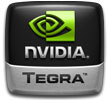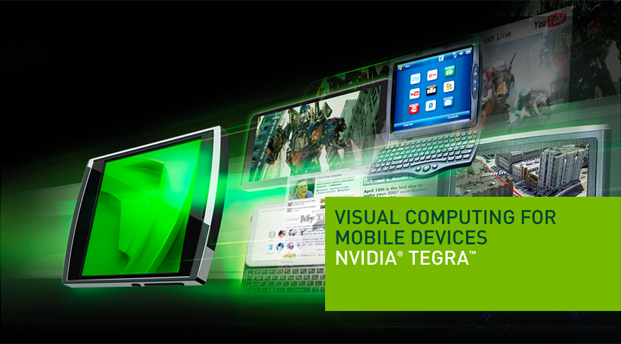 source: computerworld.com, theinquirer.net
source: computerworld.com, theinquirer.netDespite the hype surrounding Google Inc.'s Android operating system, Nvidia Inc. sees more immediate promise in Microsoft Corp.'s Windows CE for ARM-based netbooks.
Mike Rayfield, general manager for Nvidia's mobile business unit, said Nvidia preferred Microsoft's Windows CE over Android because of CE's maturity. He said Android currently has a rough user interface.
Rayfield also plugged Nvidia CEO Jen-Hsun Huang's prediction yesterday that Tegra, Nvidia's System-on-Chip (SoC) for ARM hardware, could account for half of Nvidia's revenue within a few years, while also reaping higher profit margins than Nvidia's current products.
Rayfield was coy, however, regarding reports that say Microsoft's upcoming Zune HD media player will use Tegra.

"Microsoft hasn't confirmed that ... so until they comment, I can't," he said.
For smartbooks, Nvidia is working with Microsoft to optimize Windows CE when it runs on Tegra. The counterpart to Nvidia's Ion platform for Intel Atom-based netbooks, Tegra bundles an ARM CPU (the 750 MHz ARM 11) with specialized chips designed by Nvidia for graphics, HD video encoding and decoding, stereo sound and more.
That will allow Windows CE devices to offload much of the heavy multimedia work onto Tegra, resulting in better performance, 1080p video, and low power usage. Nvidia claims that Tegra smartbooks should allow users to listen to music for 25 days or watch HD video for 10 hours, versus 5 hours and 3 hours, respectively, for an Intel Atom netbook.
Nvidia chose to work with Windows CE first, said Rayfield, because it "is a rock-solid operating system that has been shipped billions of times."
Windows CE also has a "low memory footprint and a good collection of apps," Rayfield said.
He said Nvidia is also improving Tegra for use on Windows Mobile, a close variant of Windows CE, for ARM-based smartphones.
Nvidia is working with Google to accelerate Android, which is based on Linux, when running on Tegra hardware. But it will be about a year before that delivers for smartbooks, due to existing limitations in Android, he said.
For instance, Android screen icons that fit on smartphone screens (usually 4-inches and under) are oversized on a smartbook's 8- or 9-inch screen, he said.
Also, all video and graphics rendering in Android is done today by the operating system's Java code, a technique he says is too slow for HD video.
"There's no hardware acceleration. It's all software," Rayfield said. "Everyone's talking about Android for cell phones, but the reality doesn't exist for the larger displays [of a smartbook.]"
A Google spokeswoman declined to respond to Rayfield's comments about Android.
Rayfield's comments echo those about Android by others in the emerging smartbook space. Kerry McGuire, director of strategic alliances at ARM, told Computerworld recently, "I do think that there is more work that can and will be done to bring the things we love about Android into form factors [such as netbooks.]"
Rayfield evinced even less enthusiasm for more mainstream flavors of Linux available on ARM, such as Canonical's Ubuntu or Intel's Moblin.
"The world soundly rejected the first netbooks that came out with Linux," he said. "Printers didn't work, and devices didn't get recognized. The whole thing was a mess."
Nvidia has garnered 42 design wins from 27 different manufacturers all building devices using Tegra, said Rayfield. More than half of the wins (26) are for smartbook or tablet designs. Those can arrive to market in just six months, versus two years for smartphones designed for telecom carriers, Rayfield said.
Rayfield echoed comments by Nvidia executives during its analyst day on Tuesday that Tegra could make up more than half of Nvidia's sales ($3.4 billion in fiscal year ending January 2009) very soon.
"It's an aggressive statement, no doubt. But we've got a pretty good pipeline," Rayfield said. Also, it won't be long before consumers, rather than re-ripping Blu-ray movies to watch on different devices, will expect to be able to carry a single, HD-quality version of their videos around with them for easy sharing and viewing on large-screen TVs.
By using its own graphical expertise in Tegra rather than licensing it, Nvidia hopes to reap gross profit margins of 45% on Tegra by charging commensurately for its better performance over competing platforms from Qualcomm (Snapdragon) and Freescale Semiconductor, Rayfield said.
The next generation of Tegra due early next year will boast 4 times the performance of today's version, while the 2011 update will improve performance 10 times over today's, he said.
Nvidia clarifies position on Android
We recently surprised to witness what appeared to be an 180-degree turn by Nvidia regarding Android on Tegra mobile devices, with various sites quoting general manager for Nvidia's mobile business unit, Mike Rayfield, as having said that the graphics chip firm preferred Microsoft's Windows CE.
The INQ was more than a bit perplexed at Rayfield's seemingly disparaging comments about Android to ComputerWorld, so we diligently tracked Mike down in order to clarify things.
"That article [by ComputerWorld] took a more negative slant than I would have desired," Rayfield told us when we pointed out that he'd sounded less than diplomatic towards Google's little open source Android offering.

Certainly, by saying Nvidia preferred Microsoft's Windows CE over Android because of CE's maturity and knocking Androids "rough user interface", Rayfield seemed to making an about turn from what we'd personally seen and heard from the Green Goblin at MWC Barcelona back in February.
It was also surprising considering all the analysts we spoke to about Tegra told us that imminent design wins appeared less likely at OEMs with Windows CE solutions, but Rayfield dismissed this, saying both operating systems on Tegra would do well in the market.
Rayfield told the INQ that ComputerWorld's article had somewhat confused the different smartphones and smartbooks markets, making a mishmash of how the two product segments differ. Smartbooks, or ARM based netbooks as they're sometimes referred to, are little laptops with screensizes of between 8.9 and 10.1 inches. Smartphones fit in your pocket.
"We are not handicapping either Windows mobile or Android for smartphones, we're working with a lot of customers for both of them," Rayfield told the INQ, adding that equal amounts of energy were being channeled into both.

As far as smartbooks are concerned, however, Rayfield said an initial decision was made to go with CE for two reasons, the first being that Android had issues on eight to ten inch screens which needed to be resolved. Secondly, said Rayfield, "we sort of looked at what happened a year ago with netbooks and the whole Linux thing was a disaster."
Rayfield pointed to the fact 80 per cent of netbooks a year ago were shipping with Linux, compared with only about 20 per cent now. This, said Rayfield, made Nvidia think it might be a better idea to go with "a more constrained solution like Windows CE" which he said was "rock solid in terms of its embedded applications." Since smartbooks would be distributed through carriers who wanted to offer a fairly limited set of applications in a fairly constrained environment, Windows CE sounded like the most logical option, said Rayfield.

When we INQuired about potential cost differences between Windows CE and Android, Rayfield said there wouldn't be much in it if one considered the cost of putting together one's own application stack and the support needed for Linux.
Still, Nvidia is aiming to offer both Android and Windows CE on smartbooks, just as soon as Android sorts itself out, meaning CE smartbooks should tip up in 2H09 and Android versions will appear in 1H10. "There will be android solutions in this space" Rayfield told us emphatically, adding that he is a great believer in the free market system and that consumers will ultimately be the ones to decide what they want to buy.
Let's just hope Microsoft doesn't do any, er, ARM twisting in the meanwhile to jeapordise their choice. µ



No comments:
Post a Comment